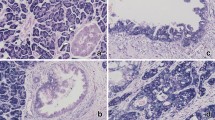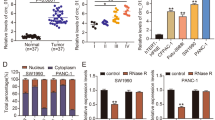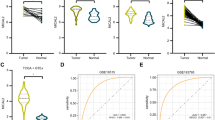Abstract
Manganese superoxide dismutase (MnSOD) expression has been found to be low in human pancreatic ductal adenocarcinoma (PDAC). Previously, we have reported that microRNA-301a (miR-301a) was found being upregulated via nuclear factor-κB (NF-κB) feedback loop in human PDAC. In this study, we investigate whether the miR-301a expression level is associated with MnSOD expression in human PDAC. We established a xenograft PDAC mouse model using transfected PanC-1 cells (miR-301a antisense or scrambled control) to investigate tumor growth and the interaction between MnSOD and miR-301a. The animal study indicated that miR-301a antisense transfection could significantly decrease the growth rate of inoculated PDAC cells, and this decrease in tumor growth rate is associated with increased MnSOD expression. To evaluate the MnSOD-miR-301a correlation in human PDAC, we have analyzed a total of 60 PDAC specimens, along with 20 normal pancreatic tissue (NPT) specimens. Human specimens confirmed a significant decrease of MnSOD expression in PDAC specimens (0.88±0.38) compared with NPT control (2.45±0.76; P<0.05), whereas there was a significant increase in miR-301a levels in PDAC specimens (0.89±0.28) compared with NPT control (0.25±0.41; P<0.05). We conclude that MnSOD expression is negatively associated with miR-301a levels in PDAC tissues, and lower miR-301a levels are associated with increased MnSOD expression and inhibition of PDAC growth.
This is a preview of subscription content, access via your institution
Access options
Subscribe to this journal
Receive 12 print issues and online access
$259.00 per year
only $21.58 per issue
Buy this article
- Purchase on Springer Link
- Instant access to full article PDF
Prices may be subject to local taxes which are calculated during checkout




Similar content being viewed by others
References
US Cancer Statistics Working Group. United States Cancer Statistics: 1999–2012 Incidence and Mortality Web-based Report. U.S. Department of Health and Human Services, Centers for Disease Control and Prevention and National Cancer Institute: Atlanta; 2015. Available at: www.cdc.gov/uscs.
Howlader N, Noone AM, Krapcho M, Garshell J, Neyman N, Altekruse S et al(eds). SEER Cancer Statistics Review, 1975–2010. Available at: http://seer.cancer.gov/csr/1975_2010/ (2013) Last date accessed 5 July 2015.
Maitra A, Hruban RH . Pancreatic cancer. Ann Rev Pathol: Mechan Dis 3: 157–188.
Cullen JJ, Weydert C, Hinkhouse MM, Ritchie J, Domann FE, Spitz D et al. The role of manganese superoxide dismutase in the growth of pancreatic adenocarcinoma. Cancer Res 2003; 63: 1297–1303.
Holley AK, Dhar SK, Xu Y, St Clair DK . Manganese superoxide dismutase: beyond life and death. Amino Acids 2012; 42: 139–158.
Ough M, Lewis A, Zhang Y, Hinkhouse MM, Ritchie JM, Oberley LW et al. Inhibition of cell growth by overexpression of manganese superoxide dismutase (MnSOD) in human pancreatic carcinoma. Free Radic Res 2004; 38: 1223–1233.
Irani K, Xia Y, Zweier JL, Sollott SJ, Der CJ, Fearon ER et al. Mitogenic signaling mediated by oxidants in Ras-transformed fibroblasts. Science 1997; 275: 1649–1652.
Meng X, Wu J, Pan C, Wang H, Ying X, Zhou Y et al. Genetic and epigenetic down-regulation of microRNA-212 promotes colorectal tumor metastasis via dysregulation of MnSOD. Gastroenterology 2013; 145: 426–36, e1–e6.
Xu Y, Fang F, Zhang J, Josson S, St Clair WH, St Clair DK . miR-17* suppresses tumorigenicity of prostate cancer by inhibiting mitochondrial antioxidant enzymes. PLoS One 2010; 5: e14356.
Ji G, Lv K, Chen H, Wang T, Wang Y, Zhao D et al. MiR-146a regulates SOD2 expression in H2O2 stimulated PC12 cells. PLoS One 2013; 8: e69351.
He L, Hannon GJ . MicroRNAs: small RNAs with a big role in gene regulation. Nat Rev Genet 2004; 5: 522–531.
Bushati N, Cohen SM . MicroRNA functions. Annu Rev Cell Dev Biol 2007; 23: 175–205.
Liu N, Olson EN . MicroRNA regulatory networks in cardiovascular development. Dev Cell 2010; 18: 510–525.
Kloosterman WP, Plasterk RH . The diverse functions of microRNAs in animal development and disease. Dev Cell 2006; 11: 441–450.
Qin S, Zhang C . MicroRNAs in vascular disease. J Cardiovasc Pharmacol 2011; 57: 8–12.
Lynam-Lennon N, Maher SG, Reynolds JV . The roles of microRNA in cancer and apoptosis. Biol Rev Cambridge Philos Soc 2009; 84: 55–71.
Zhang L, Jamaluddin MS, Weakley SM, Yao Q, Chen C . Roles and mechanisms of microRNAs in pancreatic cancer. World J Surg 2011; 35: 1725–1731.
Huang L, Liu Y, Wang L, Chen R, Ge W, Lin Z et al. Down-regulation of miR-301a suppresses pro-inflammatory cytokines in TLR-triggered macrophages. Immunology 2013; 140: 314–322.
Ma F, Zhang J, Zhong L, Wang L, Liu Y, Wang Y et al. Upregulated microRNA-301a in breast cancer promotes tumor metastasis by targeting PTEN and activating Wnt/beta-catenin signaling. Gene 2014; 535: 191–197.
Wang M, Li C, Yu B, Su L, Li J, Ju J et al. Overexpressed miR-301a promotes cell proliferation and invasion by targeting RUNX3 in gastric cancer. J Gastroenterol 2013; 48: 1023–1033.
Xu XD, He XJ, Tao HQ, Zhang W, Wang YY, Ye ZY et al. Abnormal expression of miR-301a in gastric cancer associated with progression and poor prognosis. J Surg Oncol 2013; 108: 197–202.
Zhou P, Jiang W, Wu L, Chang R, Wu K, Wang Z . miR-301a is a candidate oncogene that targets the homeobox gene Gax in human hepatocellular carcinoma. Digest Dis Sci 2012; 57: 1171–1180.
Lee EJ, Gusev Y, Jiang J, Nuovo GJ, Lerner MR, Frankel WL et al. Expression profiling identifies microRNA signature in pancreatic cancer. Int J Cancer 2007; 120: 1046–1054.
Chen Z, Chen LY, Dai HY, Wang P, Gao S, Wang K . miR-301a promotes pancreatic cancer cell proliferation by directly inhibiting Bim expression. J Cell Biochem 2012; 113: 3229–3235.
Lu Z, Li Y, Takwi A, Li B, Zhang J, Conklin DJ et al. miR-301a as an NF-kappaB activator in pancreatic cancer cells. EMBO J 2011; 30: 57–67.
Wang M, Li C, Yu B, Su L, Li J, Ju J et al. Overexpressed miR-301a promotes cell proliferation and invasion by targeting RUNX3 in gastric cancer. J Gastroenterol 2013; 48: 1023–1033.
Huang L, Liu Y, Wang L, Chen R, Ge W, Lin Z et al. Down-regulation of miR-301a suppresses pro-inflammatory cytokines in Toll-like receptor-triggered macrophages. Immunology 2013; 140: 314–322.
Acknowledgements
This project is supported by The Clinical and Translational Science Pilot Grant Program’s Basic Award and Innovative Award at The University of Louisville, and partly by Award Number R03CA137801 from the National Cancer Institute.
Author information
Authors and Affiliations
Corresponding authors
Ethics declarations
Competing interests
The authors declare no conflict of interest.
Additional information
Supplementary Information accompanies the paper on Cancer Gene Therapy website
Supplementary information
Rights and permissions
About this article
Cite this article
Pandit, H., Zhang, W., Li, Y. et al. Manganese superoxide dismutase expression is negatively associated with microRNA-301a in human pancreatic ductal adenocarcinoma. Cancer Gene Ther 22, 481–486 (2015). https://doi.org/10.1038/cgt.2015.46
Received:
Revised:
Accepted:
Published:
Issue Date:
DOI: https://doi.org/10.1038/cgt.2015.46
This article is cited by
-
RETRACTED ARTICLE: Isovitexin reduces carcinogenicity and stemness in hepatic carcinoma stem-like cells by modulating MnSOD and FoxM1
Journal of Experimental & Clinical Cancer Research (2019)



